




Punching above its weight: The revitalisation of Reefton.
Similar to many other small towns across Aotearoa, the people of the West Coast township of Reefton have been working hard to revive their town and restore not just its history but its future as well. In early 2019, key economic indicators demonstrated that what locals had intuitively felt was indeed happening: by March, the GDP in Reefton had grown by 14.6% and its labour market had grown by 14.5%, compared to the national average of 3% and 1.9%.
The decades of work to revive their town’s fortunes were paying off!
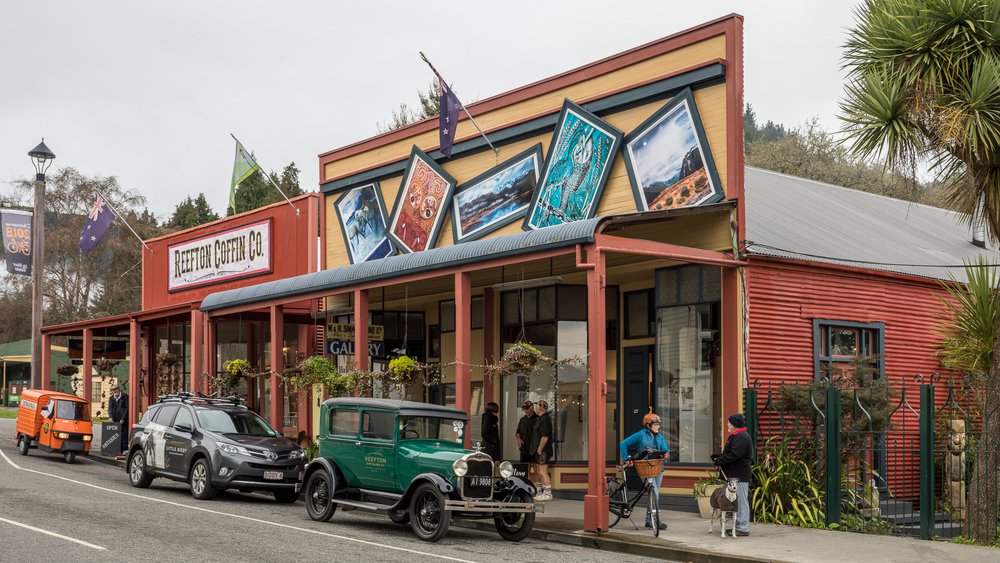
Reefton’s beautifully restored shop fronts on the main street.
A real boomtown during the heydays of hard rock underground gold and subsequent coal mining (with 2,000,000oz of gold extracted between 1870 and 1951!), Reefton, like many small regional towns, went into a significant decline during the last decades of the 20th century, struggling with a changing economy and increased privatisation. The closure of major Government departments such as the New Zealand Forest Service and Railways resulted in a drastic shortage of local work opportunities and consequent rise in unemployment in the area.
But Reefton’s locals are fiercely loyal to their place and have worked together to transform Reefton not only into a popular tourist destination, but also attractive to entrepreneurial investors and new residents seeking a lifestyle change.
Shared local vision grows collaborative local leadership
PAUL THOMAS
“You need catalysts to take communities forward.”
The revitalisation of Reefton into a contemporary, progressive town can be attributed to a mix of external backing and community-led initiatives, as well as the dedication of passionate individuals, who together have produced remarkable outcomes for their town. In his position as manager for the Department of Conservation, Paul Thomas moved to Reefton in 1990 and saw the potential of Reefton’s unique location and history despite its then rather impoverished state. He’s been a hard-working advocate for the town ever since: Paul was part of the first core group of locals pushing for change, seeing an opportunity to leverage Reefton’s unique environment and rich heritage history. Proudly known locally as the “Town of Light”, many people may not realise that the Reefton was actually the first town in the Southern Hemisphere to have a public and reticulated supply of electricity in 1888, even before London and New York!
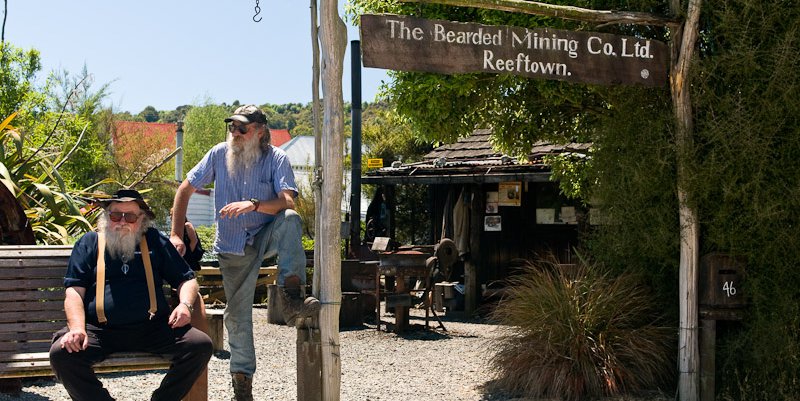
Reefton’s rich heritage is ever present.
Read more
“Town revitalisation is an organic process,” says Paul. “You need catalysts to get things going. One of the first catalysts for Reefton was developing a community vision back in 1996.”
Around 90 people came together for the “Community Revival Workshop”, and collectively put together a list of Reefton’s best attributes. This list evolved into the “Reefton Revival Plan” which proposed ways forward to build from the town’s strengths and assets. It was widely distributed within the community in the hope of getting as many people on board as possible.
The Reefton Revival group aimed to revive and celebrate Reefton’s goldfields character from the 1870s. One of the first big initiatives, straight out of the workshop, was to redesign the proposed new addition of a library to the Buller District Council’s service centre – despite significant pushback from the Council and local residents, the group managed to move forward with their vision for the new building to reflect the distinctive heritage look and wooden architecture of Reefton’s original buildings – despite a more modern build.
In 2002 the Reefton ‘Shop Front Project’ focused on further bringing back the distinctive character of the town’s main street. “This project was very innovative and transformational for Reefton,” says Paul. Led by the community’s town promotions organisation, the Inangahua Tourism Promotions (ITP) / Reefton Promotions Group, the Shop Front Project group used concept architectural drawings of Reefton’s main street buildings by local landscape architect Liam Farrell to illustrate how they would look refurbished, and together settled on a heritage colour scheme.
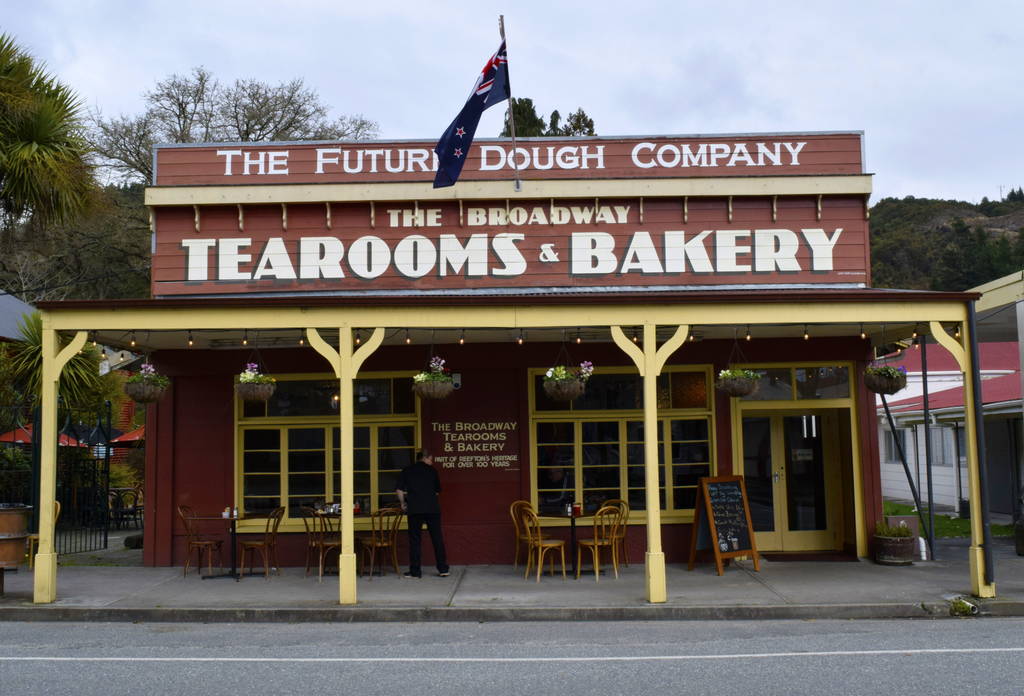
The Reefton Tearooms and Bakery are one of the beautifully restored cafés in town.
With the vision in place, the Group applied for the necessary funds from Development West Coast (DWC) to restore several shop fronts on Reefton’s main street. The ITP / Reefton Promotions Group was responsible for managing the loan received from DWC, and to on-loan the funds to individual business owners to restore their facades. “The project was a significant success story for DWC and it was a transformational project for the town,” reflects Paul. “With each phase of the project, we saw more and more buildings restored, as individual homeowners joined in and applied for finance to also fix and paint their buildings.” The cumulative result over the course of a decade created to a substantial lift in the main street’s appearance, which in turn resulted in a great sense of pride in their place for the locals, and in a new surge of visitors who were captivated by the charm of the place.
More than 20 years on, further restorations of Reefton’s building stay true to this colour palette which has resulted in a vibrant and authentic Reefton town centre filled with busy shops, cafes and art galleries. It is this distinctive look and celebration of Reefton’s heritage that really sets the small town apart from others and is not only a source of pride for the locals, but also underpins the town’s plan to secure long-term economic growth and sustainability. This vision has also attracted new entrepreneurs, investors and visitors alike.
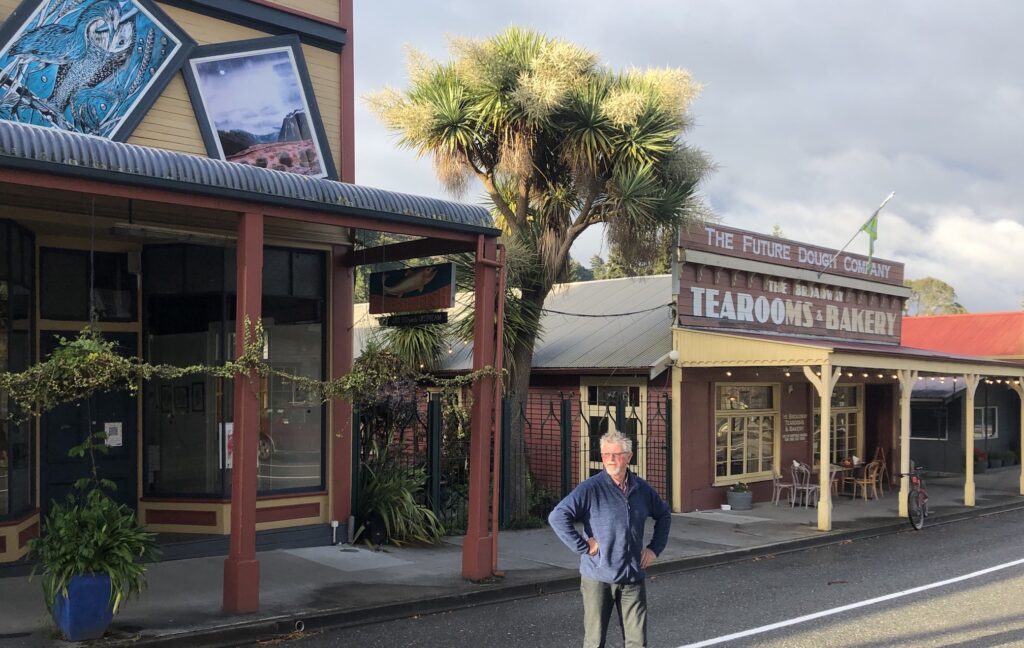
Paul Thomas on Upper Broadway where a significant first phase of the Reefton Shop Front Project took place, including the Hale Gallery on the left.
Drawings for the Reefton Market’s transformation into Hale Gallery.
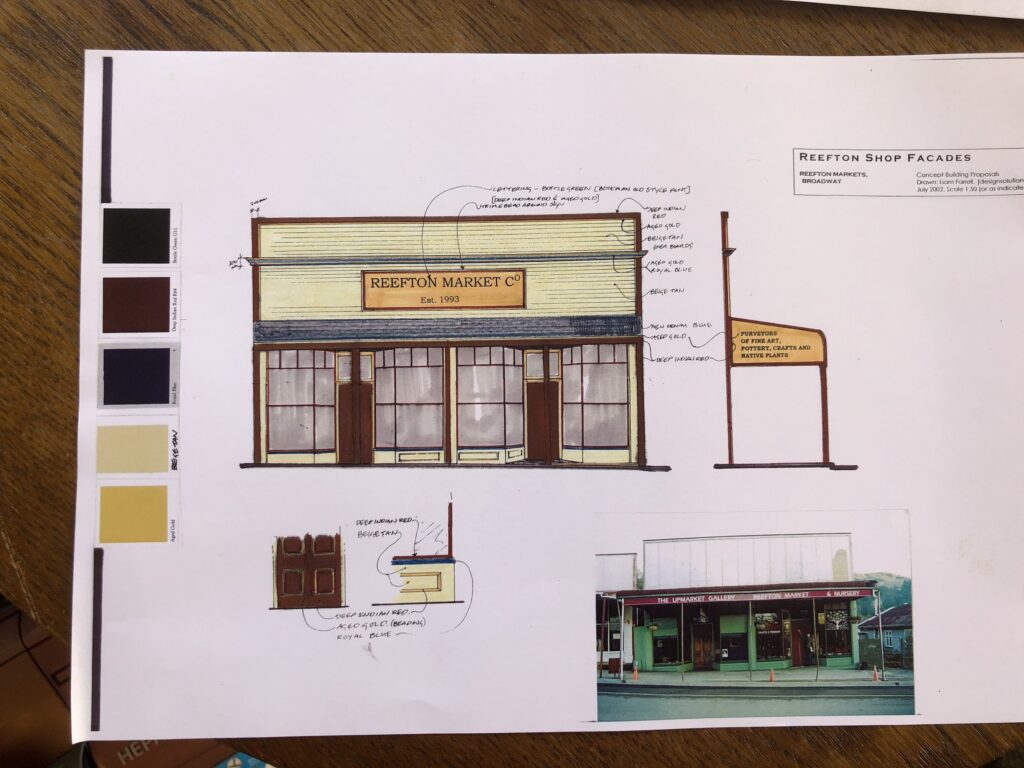
“The investment by DWC into Reefton through the shop front project was an innovative model, a leap of faith at the time for community-led economic development, and it has created immeasurable results that have ensured the town’s long-term sustainability,” Paul says.
Working with diverse groups, ideas and skills
“What has happened with the shop fronts since the early 2000s has been sensational. The face of the town has now changed – now we have a town that we are all very proud of.”
HELEN MCKENZIE
Helen McKenzie grew up in Reefton before moving away in her twenties, and recalls that during her frequent visits back, Reefton was “a busy little town, but things were starting to look a little sad”. Returning home about six years ago, Helen now describes her hometown as being back to its old buzz and attracting new residents with its restored heritage buildings and beautiful surroundings: “People often comment that ‘it’s just like Arrowtown before it got too developed’.”
Helen now manages the local Dawson’s Hotel and reflects that the secret to the town’s resilience lies in its many offerings – unlike other heritage towns, it does not solely rely on tourism. Gold and coal mining remain critically important for local employment, as well as the local dairy industry, the native timber mill and the service sector supporting these industries.
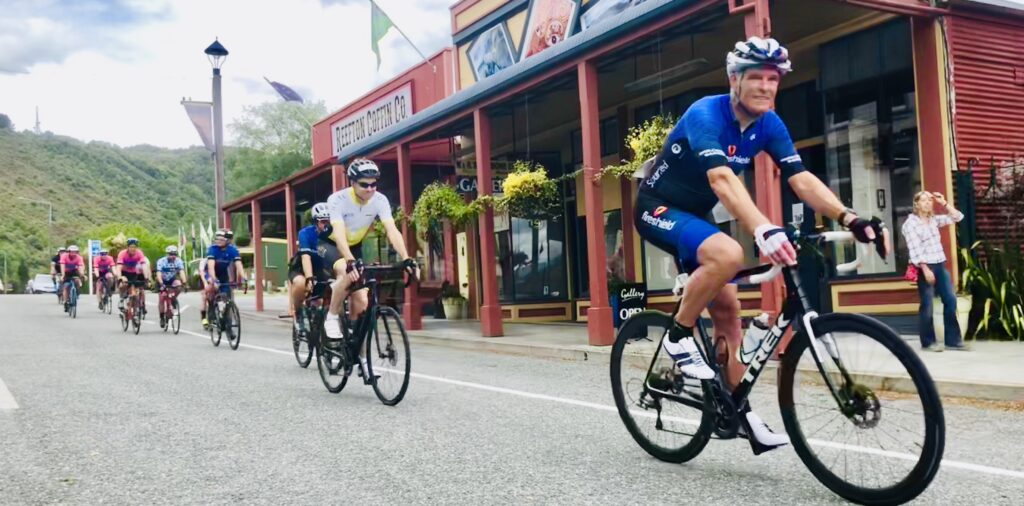
Mountain biking plays a big role in Reefton, for locals and visitors alike.
“It’s all about balance. You need socio-economic stability, but you also need to be mindful of the needs of the community,” notes Helen with a nod to many Reefton residents’ wish to maintain the town’s small size and quiet lifestyle despite its economic growth.
“Where else in the world, after a day of there not being a carpark to be had, can I have a chat in the middle of the main road at 5pm in the afternoon? That’s exactly the kind of town I want to live in.”
JOHN BOUGEN
Paul agrees that it’s the diversity of businesses, skills and ideas that makes the town sustainable, plus the variety of groups and skill sets that are coming together to push forward ideas and projects, citing the current restoration of the community theatre, funded by the Buller District Council as one example. John Bougen, another local resident deeply invested in Reefton’s revival, adds that this fund has also extended to the Reefton Racecourse where the Grandstand and Tearooms are receiving further much needed refurbishment, as well as the restoration of the historically important Railway Station and Oddfellows Hall. Furthermore, another recently received substantial grant will see the Strand Revitalization Project completed, which was initiated 25 years ago and will finally link the town to the Inangahua River on which it was founded.
“It’s a knock-on effect. Once people see that something is working, they want to be part of the success,” says John. “And it’s amazing how you can find the funds you need once you have proven you are actually doing good things for the community.”
Building from strengths
“Authenticity is fuelling Reefton’s future.”
NZ BUSINESS MAGAZINE, DECEMBER 2019
It’s the entrepreneurial spirit of locals and newcomers alike that has been another catalyst in Reefton’s return to vibrancy, agree Helen, Paul and John. One example of a home-made success is the popular Reefton Distilling Co which, founded by another returnee Reeftonian, Patsy Bass, has gained an excellent reputation, and business success, selling their goods both nationally and internationally.
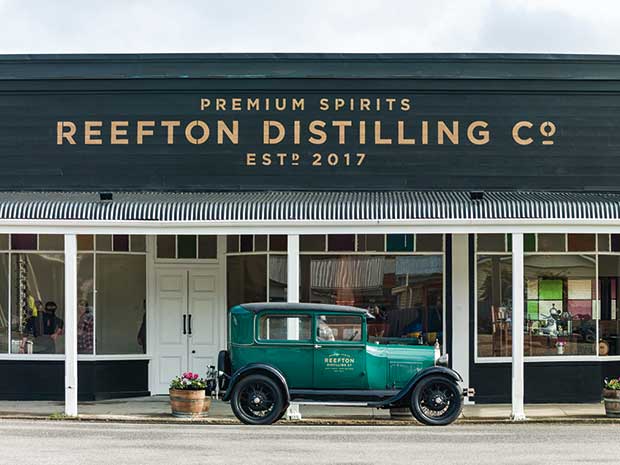
The Reefton Distilling Co is housed in one of Reefton’s original buildings which has been carefully restored to accommodate the working distillery, tasting bar and retail store.
Another is John himself: the self-made businessman turned Buller District Councillor who fell in love with the place and its people when he moved to Reefton five years ago. “People here on the West Coast are so friendly and have such a positive, cheery disposition. Things are possible here, people are open to ideas.”
Humble about his own contributions to Reefton’s recovered economy, John is quick to point out that the community has always been the main driver behind returning Reefton to its old glory:
“The fire has been lit a long time ago -all I have done in the last five years is put a bit more petrol on.”
JOHN BOUGEN
John’s can-do attitude and investment in the restoration and re-purposing of heritage buildings in town have continued on from the Shop Front Project to others, like the repainting of the old mining school, the complete rebuild of the original gaol, along with a number of shops on Broadway, Reefton’s main street. These heritage buildings are now a stunning backdrop to every visitor’s holiday photos and have moreover created local jobs and sparked ideas for new ventures, from the likes of another local who is now building tiny houses at Reefton’s old mill, and Andy and Sarah Parker who have boldly and faithfully restored the old Knox Church.
“Reefton is now thriving and people are committed to keeping this going,” says Paul. John adds that the shared vision is very much to enable and support ideas to keep that momentum going: “The great thing about the West Coast is that you just do it. We have everything here – opportunities are abundant.”
And it’s not just business owners who have been ramping up the pace in Reefton. Local artists and artisans have been busy creating a burgeoning creative and social hub. Their contribution is apparent all over town, including the Friday nights at the Workingmen’s Club which now hosts a vibrant scene. The local galleries have never been busier, attracting more and more visitors. “Reefton has become a real go-to place,” agree John and Paul.
A long-term vision for lasting change
This is also reflected in local government’s attitude towards supporting bigger projects and the continuous building up of skills amongst the community. “There is lots of enthusiasm around the Council table,” says John. “Now is really Reefton’s time.” He adds that while Reefton has a core team of leaders doing a great job at working on the ongoing development of their town, they are also mindful to “leave the door open for other people to come in”.
“There’s always been different key people at different times who have carried things through – everyone brings a different skill to the table.”
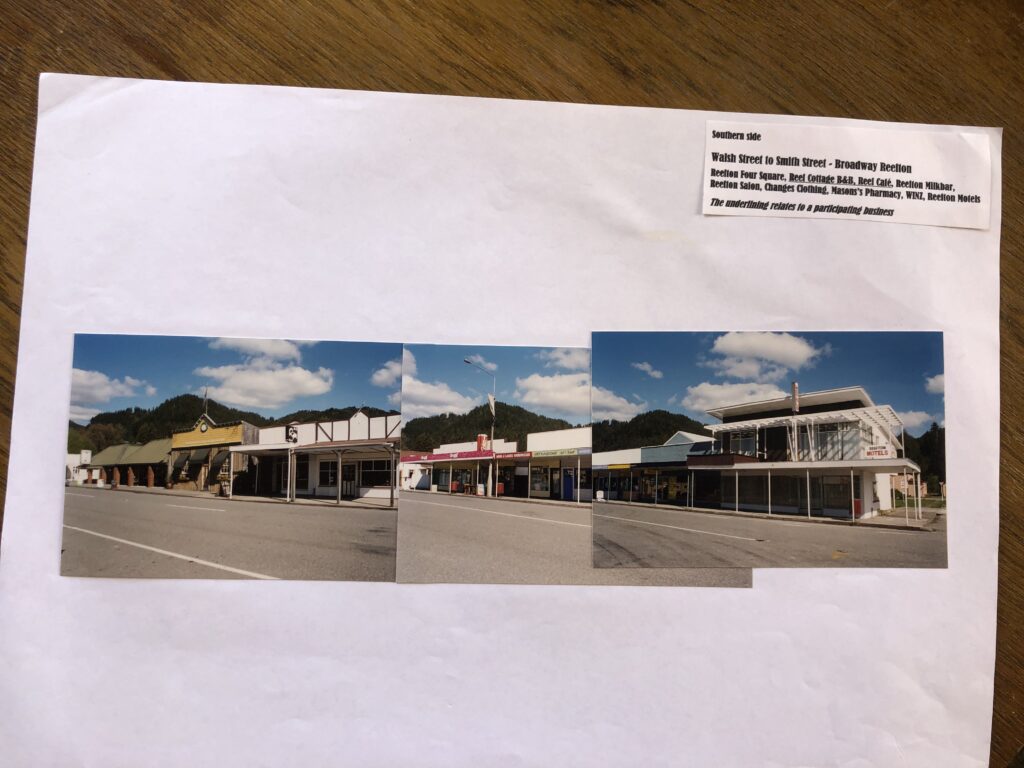
Reefton’s Walsh to Smith Street in 2002.
The same area, almost 20 years later: Walsh to Smith Street in 2020.
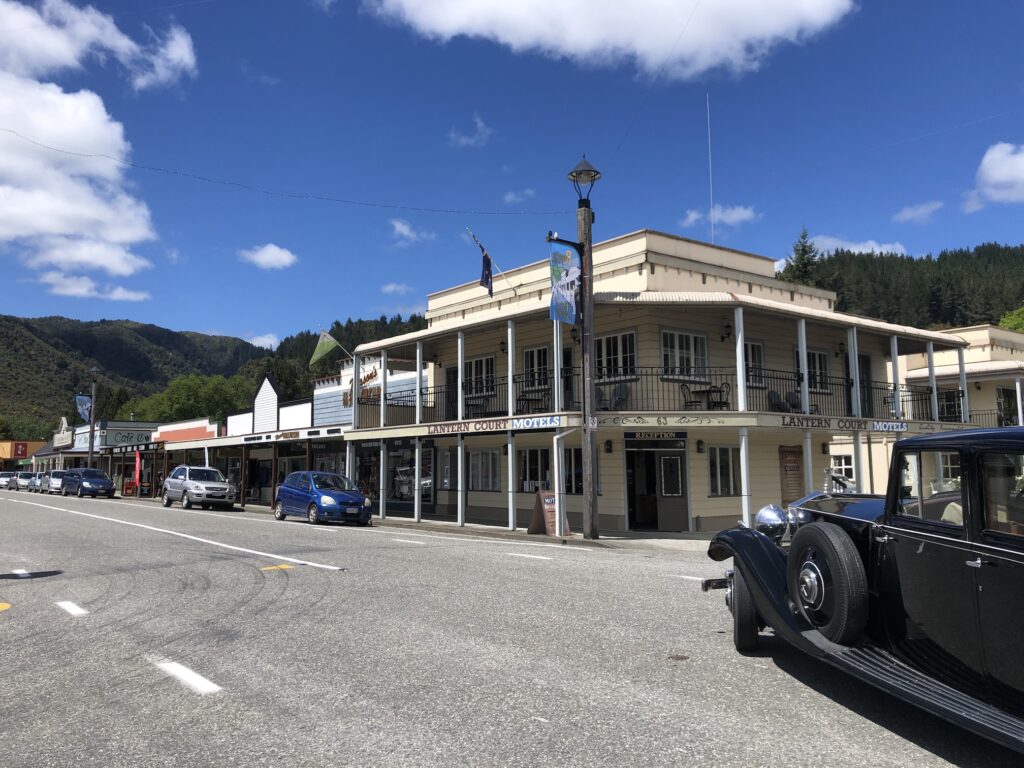
Paul adds that there has always been real stand-outs among the people who have dedicated their time and energy to their community: “It’s often me who gets interviewed for the papers but without people like Ronnie Buckman for example, we could not have achieved what we have. Ronnie has been pulling cords behind the scenes all these years. Not only was she our first Visitor Centre Manager back in the 90ies and then stepped into promoting our town and cause, she’s been essential to building the relationships between the community and the funding agencies. She’s a local, a real ‘West Coaster’, she’s been our connector for the Revival Project all along.”
All agree that everyone needs to be committed to the long haul – maintaining a flourishing community and a buzzing town is an ongoing project, not one that’s finished after a few years work. Working together as a community is all about finding the right balance between people’s needs and wishes for their town, and the economic realities of keeping everyone in jobs and business. Community and local business development must go hand in hand.
“It’s important to have these constant conversations, is it working, or is it not working? And making adjustments as you go along.”
PAUL THOMAS
